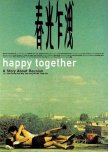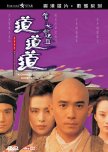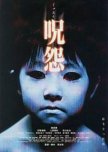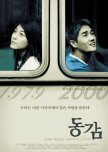
This review may contain spoilers
A K-Drama Examining Unhealthy Relationships and Going against the Grain?
There's something to be said about a series that seems to be angling to be a critique of what is all too common in K-Dramas, or the romantic genre period. Rewarding the asshole, and sweeping their behavior under the rug, because that's what you do or expect."Nevertheless" is a fairly frustrating series to watch. The indecisiveness of the lead, and the manipulation of the love interest, made me want to throw objects at my television and computer screen. It was enough that I stopped watching the series in 2021 or so before deciding to resume in 2023.
In one instance, the writing appears self-aware enough not to play into the common cliches of K-Dramas, while at the same time playing right into them. By that I mean, Na-Bi's indecisiveness, or emotional vulnerability, and allowing herself to be strung along by Jae-Eon, while at the same time knowing that none of what's going on between them is sincere in the least (but she wants it to be real).
With Jae-Eon, it's clear that the script wants to play heavily into the "sympathy for the devil" angle with his character. That his reasons for being flighty, mean-spirited, and typically dishonest with the women he's with, is some act of self-protection. But it's hard to feel any empathy for his character when so much of what comes out of his mouth is dishonest or a half-truth. As the series progresses, his poessiveness and minimization of Na-Bi's feelings, and her relationships with other people (other men, really) don't do anything but want me to see her far, far away from him.
The supporting cast all appear to be sounding boards for Na-Bi's conscious and critical thinking skills that she's not using. They all see her going down a real self-destructive path by remaining with Jae-Eon, but they can only tell her how they feel about it, and ask her, "Do you really think this person is being honest with you?" And of course, Na-Bi remains indecisive and chooses not to listen to her instincts, even as Jae-Eon begins to mirror her ex-boyfriend (who made a sculpture of her in a sex position, for public viewing, without her consent) more and more.
The end of the show really seems to bring all the emotional turmoil together in the ninth and tenth episodes, where, after being emotionally yanked around by Jae-Eon, Na-Bi finally snaps and lays down the law. She won't allow this dude to manipulate her anymore, even if he decides to be honest and tell her that he has genuine feelings for her. And, for me, that would've been enough to give this series high markings, a 10/10. A K-Drama that doesn't feed into the bad feedback loop of "asshole gets the girl".
But, the show dismantles itself by pairing Na-Bi and Jae-Eon together in the end. And all because of a plot thread that would make it seem like their relationship is the stuff of "Star-crossed lovers". The show even appears to know that it's absolutely bonkers for Na-Bi to be with Jae-Eon. A line by the way of "I'll worry about that later" only seems to exist to dismiss arguments.
Overall, despite some stellar performances, the writing lets down what might've been a pretty solid drama. It's fairly reflective of the idea that something in the culture of South Korea really doesn't want to hold assholes like Jae-Eon accountable, because, not unlike the United States, so many of those types are the ones that get idolized as the ideal person.
Was this review helpful to you?

Like everyone is saying (on Letterboxd), "The Suspect" is a film that feels heavily influenced by the Paul Greengrass's "Bourne" films ("Supremacy" and "Ultimatum").
It's six years (circa 2013) too late to be accused of jumping on the hype train (like other American films, ah-la "Taken") and six years too old to be anything particularly entertaining or thrilling if you've seen the Bourne films and its imitators later down the line before this.
Despite being headlined by Gong Yoo (who, lathered up in the most egregious fake-n-bake, feels miscast as the stoic North Korean defector), I can't really find anything particularly positive to say about the film outside of its production values.
"The Suspect" lacks any of the subtlety or even so-called anti-government sentiment that Greengrass's "Bourne" films were accused of. If "Supremacy" and "Ultimatum" could be perceived as an indictment against American foreign policy because of their unflattering depiction of the US Government, "The Suspect" is rather the opposite despite featuring antagonists with government positions.
More to the point, I feel like I've been dropped into the middle of a story that had a film preceding this film's story. What's going and why I should exactly be rooting for or against anyone is a bit difficult to suss out even when I think I've gotten a handle on things.
Was this review helpful to you?

"Zu: Warriors From the Magic Mountain" has the distinction of being known as the film that inspired John Carpenter's 1986 fantasy film, "Big Trouble in Little China". Now that I have that context, the influence of this film is fairly evident throughout "Big Trouble in Little China". Not the blatant orientalism (a specifically western problem), but just how muddled and convoluted it is as a narrative "in middle of things", and as a visual effects film.
Sammo Hung is in this movie and they have him dressed like a fifth century Mario Luigi. The fate of billions depend on a bunch of kids who have to save the world from the devil because the adults are too busy drawing lines in the sand! Easily as you could sum this movie with a basic "Character A and Character B do [blank]", watching it in real time reveal a story that tends to be hard to follow and piece together.
The enthusiasm that went into the film's special effects is pretty clear from the jump, it's just a shame that none of that energy translated to the greater narrative. Fun as it is to watch the characters kind've fumble their way through one event after another, none of the characters really leave a lasting impression on you. Performances as a serviceable as they can be in a film like this, and certainly do enough to maintain the goofiness of the story.
If you've never seen this film before, but might've heard about it, give it a chance. You might have fun.
Was this review helpful to you?

Shusuke Kaneko and Kazunori Itō were given the monumental task of reimagining what was largely considered a “Godzilla knockoff” (and a cheap one at that) aimed at children, and getting a 90s audience to buy into the idea of a giant turtle monster fighting prehistoric (manufactured) birds of prey.
For everything Daiei Films’ "Gamera: Guardian of the Universe" had going against it (including its director being a Godzilla stan dying to direct a "Godzilla" film), Kaneko and Itō craft an origin story that capitalizes Gamera’s relationship with children (a teenager in this case) without becoming an overly confectionery narrative (ah-la "Gamera The Brave").
The movie balances the tones of humor, horror, and drama and features some of the best set and suit design for a mid-90s giant monster film. This is the kind of reboot "Godzilla 2014" wanted to be for Godzilla, but never achieved.
Was this review helpful to you?

A gorgeous looking film about two men who don't love (or like) each other (anymore), but are too comfortable in their particular ruts to really admit it to each other (or themselves).
Solid performances all round, but I just didn't care about the characters or the wild swings in their crumbling dynamic.
And Now that I've seen it, the constant comparison to Barry Jenkins' "Moonlight" feels incredibly misguided or wrongheaded (even if this film was an explicit influence).
Was this review helpful to you?

This review may contain spoilers
[Watched/Reviewed on Letterboxd 5/03/2021]One of the influences behind "Xena: Warrior Princess" (and "Mortal Kombat 3"), "The Bride with White Hair" feels more like a lead-in to a more substantial story than a narrative unto itself.
The literal Bride with White Hair doesn't show up until the climax of the film, something that feels altogether rushed, but no less satisfying as a conclusion to the film that is basically a flashback setting up events for its sequel, "The Bride With White Hair II".
The film is supported primarily by its flair, 'wuxia choreography', and visual style. Outside a reliance on anti-Black and anti-indigenous stereotypes (actors walking around in outfits seemingly inspired by the Tiki villain in ,"Scooby Doo," and brownface), the film's soft lit, dreamy cinematography works for the almost fairy-tale approach to the story.
It communicates just enough about its lead characters (Cho Yi-Hang and the wolf-girl, Lian Ni Chang), and the ideology of their supporting cast that, even with how rushed things turned out, the story isn't a clear cut tale of good and evil.
It's a solid example of what happens when vendettas and tribalism turn communities on each other. It's just a shame that the story never tried to build Cho Yi Hang and Lian Ni Chang's relationship to explore that rift outside their apathy or objection to war altogether. Most of their screen-time is wasted on soft-core (porn) sex scenes in the water.
Was this review helpful to you?

A 'Sequel' that Ends up Spinning its Wheels
[Watched/Reviewed on Letterboxd 5/13/2021]"Basically a retelling of A Chinese Ghost Story" Amazon Prime nakedly claims in its summation of the film. Whoever wrote the summary is not wrong in the least, but now the ghost dame likes being evil, and its Monk protagonist is genre savvy to ghosts.
It's kind've disappointing when you consider how many ways from Sunday you could tell a continue a "Chinese Ghost Story", but sometimes folk just become a bit too taken with their first idea to break away from it.
Was this review helpful to you?

So that's where "Xena: Warrior Princess" got it from!
[Watched/Reviewed on Letterboxd 5/12/2021 ]There's a lot about "A Chinese Ghost Story" that feels improvised (less so than its sequel, which felt all over the place) as it follows a down-on-his-luck and wayward scholar (who doesn't do much scholarly work), and becomes swept up in a supernatural tryst with a ghost forced to kill human beings to appease a tree demon. It's a good kind've improvisation, though.
The apparent influence of Sam Raimi's "Devil Dead (1981)" is hard to ignore, which makes A Chinese Ghost Story's influence on "Xena: Warrior Princess" (that underwater kiss between Xena and Lao Ma in "The Debt", the entirety of the season six finale, "A Friend in Need") a great example of how art is always in constant communication, influencing others.
Was this review helpful to you?

This review may contain spoilers
A Genuine Attempt at a Story about two Women from Different Worlds
When this series debuted on Netflix, I watched maybe about a minute of it before I dropped it and moved on to something else. I didn't think about it again until December 2020. I'm currently in the mindset of giving (SOME) shows that initially didn't leave the greatest impression on me a second chance, so "A Taiwanese Tale of Two Cities" seemed like the obvious place to start.But here's the thing. I don't think I was wrong in my first impression of the show. The beginning of ATTOTC is rough as hell. There's a sense that the show doesn't quite know who its characters are, or what direction it wants to take them. I know it wants to be a story about two women who grew up with different impressions of Taiwanese culture (one through assimilation, the other through a conservative environment thats 'trying' to become more open in response to its latest, and youngest generation's demand for change).
The theme that declares one must "love yourself before you love anyone else" (IIRC) falls pretty safely within the basics of a 101 feminist tale of self improvement and female friendships. Yet, for the first couple of episodes, I got the feeling that the writers just didn't know how to do that without relying so heavily on comedy. (We're throwing spaghetti at the walls, in other words.) I constantly kept wondering if I was supposed to be laughing at how sheltered Nian-Nian was, or if I was meant to root for her growing freedom from her parents. Jo, on the other hand, felt like she always had the clearer story as a young woman trying to reconnect with her roots, and mend broken family ties.
ATTOTC has all the technical markings of a forgettable, low-budget rom com series. The audio can be hard to hear sometimes, especially the non-subtitled English spoken by the characters. The lightning is often terrible (over bright, saturated to the point where everyone looks pale as death), every thing looks washed out, and the non-diegetic music can really grate on the nerves (especially that country song in the credits that begins abruptly, and without warning). Performances are incredibly shaky at the beginning, but I think most of the cast finds their footing toward the midpoint.
The two love interests (Tiang-Ming and Ryan), while generally unremarkable, do at least add some genuine conflict that centers the narratives of Jo and Nian-Nian. When they're facing troubles, the girls don't take it on the chin. They push back, and challenge their beau's. The story doesn't revolve around the pride and reputation of the men courting them in the face of disapproving parents (though it teeters awfully close to that).
The show does a really great job of keeping Jo and Nian-Nian connected when they live worlds apart from each other. There's this really neat of effect of depicting the two having conversations sitting right next to each other, but their surroundings maintain one is in San Francisco, and the other is in Taipei, Taiwan. There's also the occasional video chat, and cell phone text that's just as effective.
To disappoint, I truly don't think the show finds its focus and footing until episode eight. And it's to that point that I think me suggesting that the viewer "hang in there" until then might be asking for a bit much. Especially since I admit myself that the show is a rough watch for the first seven episodes out of twenty. Unlike some dramas, I do think this show earns your attention if you're willing to stick with it. It manages not to become aimless as it marches toward its finale, but you really have to survive those first seven episodes. (If it doesn't hit you, just drop it, fam.)
Of the things I appreciated is how they handled Nian-Nian and Ryan's relationship. ATTOTC forgoes the goofiness of the female lead falling into the guy's arms, the awkward stares, and the male protagonist constantly trying to control his beau's body by yanking at her arm. Instead we get some genuine drama.
Nian-Nian doesn't quite know how to adjust to the culture shock with how Ryan handles his messy former relationships (with multiple ex-wives), and Ryan is less than patient with her (sometimes) when it comes to how judgemental, and shame-focused she is about how people might see her in the context of his previous dynamics.
Unlike "Familiar Wife", their story doesn't hinge on the idea that they're destined or fated for each other. Whether they work out or not hinges entirely on how they communicate with each other, and I think the show handled that better than most dramas. The fact that they were constantly on the verge of breaking up really got me down. I wanted to see the two of them work it out, and while the show suggests its possible, we're basically left wondering. I'm both okay with that, and yet not.
Jo's relationship with Tiang-Ming I'm generally indifferent to. It's not terrible, but there were times where I felt like it simply existed to have Jo's time focused on something other than the family drama between her estranged grandmother, and mother while she was in Taiwan. Still it plays to the strengths of the characters.
(Not to harp on this, I like that she leaves when she feels like being taken for granted and Tiang Ming has to reevaluate how he's been acting. I'm sorry, it's just so refreshing.)
Overall, I really enjoyed my time with ATTOTC. It's not great, but its the effort it's puts into the relationship between Nian-Nian and Jo that made me stick with it once I re-committed myself to it.
Was this review helpful to you?

Stories about the dubious practice of the mail-order-bride system (marriage agencies) usually aren't my cup-of-tea. That "Dear Lena" dared to tackle the story of Russian-born Korean woman named Lena, and a farmer with aspirations to be a father, gave me certain ideas about where the story could've gone (that I'm glad it didn't).
As a slice-of-life story, "Dear Lena" merely explores how the title character adjusts to life in South Korea outside the context of Russia. It's not interested in being critical of marriage agencies, and even less interested in examining the controlling nature of the men in Lena's life.
Her relationship with her husband is largely portrayed as positive, with him wanting to do everything he can for her when he finds out she's sick. The film, at the very least, ends with her independence and freedoms recognized.
Was this review helpful to you?

This review may contain spoilers
"Escape From New York" returns to the Zombie Genre
[Written/Watched 24 Dec, 2020 on Letterboxd]Right off the bat, "Peninsula" feels like an appeal to the more action-oriented audience of the zombie genre and Western (white) audiences (with the irritating presence of white actors, calling the undead 'zombies' instead of some precious in-universe nickname, our protagonist being a military dude).
In that sense I do feel like it doesn't understand what made "Train to Busan" and "Seoul Station" so appealing to everyone back in 2016. (It wasn't the action, but how it chose to tell its story from the perspective of civilians, all while subtly criticizing South Korea's classism, privatization, and the treatment of the homeless.)
On the other, this is just director Yeon Sang-ho choosing to do something different whilst appealing to the market. "Peninsula" and the "Beyond the Thunderdome meets Resident Evil 4" vibe just feels like the inevitable fate of most zombie genre stories. And that's not a bad thing if you don't hold the zombie genre in some high esteem (especially almost twenty years since its resurgence as power genre in 2002).
And for all of that, "Peninsula" never veers into the tired and violent territory of "The Walking Dead" or other serialized zombie dramas that became parodies of themselves (because capitalism demands franchises continue beyond sustainability). The movie knows how to have fun with the genre, and revels in its silliness more than anything. (Nothing proves this more than the wild car chases where the two kids outsmart both the zombies and mad ex-military goons with some "Tokyo Drift"-level driving.)
The themes of "Busan" and even "Seoul" remain (community vs. individualism, capitalism and militarism exploiting and dehumanizing the disadvantaged), expanded to a broader, actiony scale. The humans know to work together to survive, but most still fall victim to the zombies and their own violent tendencies, wrapped up in material and military nostalgia of a world still killing itself for both.
Considering our central character really isn't given a moment to be before he's thrown into the deep-end of angst and a tragic past (a dead family, sans a brother-in-law), the film sets up the expectation of simply not expecting much from its motley crew of characters.
None of them are terrible per-se, and the film certainly tries to center their humanity above all else. But they're definitely more archetypal than the casts of "Seoul" and "Busan", who seemed determined to rise above their types and leave their audiences talking about them for days after.
Basically, more time is spent getting the characters from A-to-B than actually developing the characters so that their actions matter once the destination is reached. It doesn't earn that melodramatic Deus Ex "Resident Evil" ending (zombies respectfully maintaining their distance from the chopper as it rides off into the sunset).
Was this review helpful to you?

This review may contain spoilers
[Written/Watched 24 Sep, 2019 for Letterboxd. Expanded 1/21/2021]One of the strengths of "Ju-on: The Grudge" is how it establishes the narratives around the people who enter the Mount Doom equivalent of a house that seems to swallow families without mercy. It's set up like a collection of short stories that connect with each other instead of a singular narrative from a single character's point of view.
I don't think it can be understated just how doomed the people in this story are. The grand majority of them entering the house, drenched head-to-toe in undying anger, become unsuspecting victims of domestic violence that went unnoticed by anyone outside the house.
Anyone connected to the victims are as good as dead. The ghost and its other victims stalk them, crossing the boundaries of homes they were never welcomed into.
Hitomi, for instance, didn't see anything, she didn't even know what happened to her brother's wife. Yet, the vengeful spirit basically came after her with extreme prejudice anyway.
Ghosts who lash out and merely perpetuate their suffering. The "it is what it is" nature of the story is the strength of the film's unsettling nature.
Was this review helpful to you?

This review may contain spoilers
A Romantic Debut with Bad Execution
[Written/Watched Jun 03, 2019 for Letterboxd. Expanded 1/20/2021](I'm going to try to expand on what I originally thought of this film.) "But, Always" is incredibly melodramatic, and I was content to write this film off as too indulgent in its sappiness. But, for the most part the relationship at the heart of the film is kind've sweet, and genuinely romantic. At some point I was genuinely convinced that this was going to be a slice-of-life romance about two childhood friends.
The hard swerve it takes near the mid-point of the story and its very end soured me on the overall product. When Zhao Yong Yuan (the protagonist) lands in legal trouble, the film goes above and beyond to keep him and An Ran (his sweetheart) separated in the most inorganic way possible. It uses the his best friend as proxy for An Ran's heartbreak, inadvertently suggesting that his best friend was envious of their relationship (but never investigates that angle). It's such a lazy way of creating conflict when his imprisonment (IIRC) would've been enough to test the foundation of their relationship. Think Barry Jenkins' "If Beale Street Could Talk".
The "antagonist" of the film, aside from the inability to properly communicate, is the class differences of the two characters. Yong Yuan is working/lower class, and An Ran is financially secure, wealthy. To some degree, Yong Yuan's lack of financial security (as the son of a "peasant" mother) drives the consequences that keep them separated. Meanwhile, An Ran (whose mother was a doctor) doesn't ever consider it because she isn't in the same bind as he is, and towards the end of the film, she even challenges his preoccupation with money (IIRC, it's been a minute, y'all).
"But, Always" asserts that Yong Yuan solves his problems by becoming wealthy, and its to that end that I hate the sudden indulgence in wealth that the film veers into with him. It's one of the things that bugs me about dramas that put such a huge emphasis on it, and the film doesn't investigate the trauma of his poverty to really justify it.
Yong Yuan becomes someone I dislike, and his actions goes against what I liked about the character to begin with. Yet the film more or less says copious amounts of money is really all this character needed to rise above his hardships and win An Ran back.
Like others have obviously mentioned (at some point), "But, Always" concludes the same way as the 2011 film "Remember Me" ( starring Pierce Brosnan and Robert Pattinson). In the process of watching the film, I initially assumed "Remember Me" was an adaptation of "But, Always", but it's just another genre film on the same wavelength of terrible ideas and not the origin point of one of the worst movies of 2011.
"But, Always" is audacious in its presumption that such a move will endear it to its audience. And maybe for those disconnected from the event and all its baggage, it did and will. For the time being (as far as the US is concerned), romantic stories using 9/11 as a backdrop or stinger for their narratives just don't land. I would argue we're just not at a place where 9/11 has become the "World War II" of historic disasters where using it as plot fodder is readily welcomed.
To that end, I would've thought one movie doing poorly on account of using the 9/11 Attacks as a plot twist would've scared off anyone else, but that's clearly not the case.
Was this review helpful to you?

"Hidden Fortress" is a little like "Yes, Madam!" The sense that the headline stars (reviews spent so much time hyping up) with the traditional straight-man roles, are sort've secondary to a tale of a comedic odd couple. The pair who fumble their way through circumstances grander than them.
I can definitely see the influence it had on "Star Wars", and with this in hindsight, George Lucas's film feels like a dilution of Hidden Fortress's less flashy approach to storytelling.
Was this review helpful to you?

There's something amusing about the fact that "Ditto" was released the same year as Toby Emmerich and Gregory Hoblit's "Frequency" (2000) and shares a similar premise about a magic ham radio.
But where "Frequency's" tale of a man living in 1969 connecting with his adult son in the future in a joint effort to solve cold case murders made for an adventure worth investing in (and used its gimmick to the fullest extent), "Ditto" chooses instead to wallow in melodrama of lost romances and broken hearts. It takes what could be a fairly interesting premise about a relationship disconnected by time, and squanders it entirely.
Time travel romances are a dime-a-dozen in K-Dramas. You'll find them more often than you will here in the states, yet there are more misses than hits. Overall, the ham radio barely figures into the story in any meaningful way. What could've been a cool gimmick like the mailbox in "Ill Mare" (or its counterpart, "The Lake House") is wasted.
Just watch "Frequency" instead of this.
Was this review helpful to you?










